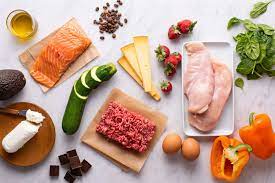Healthy Foods for Humans: What to Eat and Why

Eating healthy foods is one of the best ways to support your overall health and well-being. Healthy foods provide your body with the nutrients it needs to function properly, prevent diseases, and maintain a healthy weight. But what are healthy foods, and how can you include them in your daily diet?
What are healthy foods?
Healthy foods are foods that are rich in nutrients, such as protein, fiber, healthy fats, vitamins, minerals, and antioxidants. These nutrients help your body perform various functions, such as building and repairing tissues, regulating metabolism, supporting immunity, and fighting inflammation.
Some examples of healthy foods are:
- 9144 RRB Technician recruitment 2024 : Last date 08-04-2024
 SI No. RRB Region participating in CEN No. 02/2024 Zone Technician Grade I Signal Technician…
SI No. RRB Region participating in CEN No. 02/2024 Zone Technician Grade I Signal Technician… - asst/assoc prof & prof job recruitment in VRSEC (deemed university SAHE)
 (46 Years of Excellence VELAGAPUDI RAMAKRISHNA SIDDHARTHA ENGINEERING COLLEGE (AUTONOMOUS), VIJAYAWADA. Approved by AICTE –…
(46 Years of Excellence VELAGAPUDI RAMAKRISHNA SIDDHARTHA ENGINEERING COLLEGE (AUTONOMOUS), VIJAYAWADA. Approved by AICTE –… - 5696 Assistant Loco Pilot in Railway Recruitment 2024
 1) Applicants to the post of ALP notified under CEN 01/2024 are aware that the…
1) Applicants to the post of ALP notified under CEN 01/2024 are aware that the… - Here are Gemini AI Chatbot Features
 Gemini AI Chatbot Features and Descriptions Gemini AI is a chatbot enhancement tool developed by…
Gemini AI Chatbot Features and Descriptions Gemini AI is a chatbot enhancement tool developed by… - Latest Technologies in 2024
 Latest Technologies in 2024 The real estate industry is undergoing a digital transformation, and the…
Latest Technologies in 2024 The real estate industry is undergoing a digital transformation, and the… - Top 5 Laptops Under ₹40,000 in India December(2023)
 Top 5 Laptops Under ₹40,000 in India (2023) The search for a budget-friendly yet powerful…
Top 5 Laptops Under ₹40,000 in India (2023) The search for a budget-friendly yet powerful… - The Ultimate Guide to Diet Plans for Weight Loss
 The best diet plans for weight loss programs would require a deep dive into various…
The best diet plans for weight loss programs would require a deep dive into various… - 10 ways to earn money free online without investment
 There are several ways to earn money online in India without any investment. Some of…
There are several ways to earn money online in India without any investment. Some of… - wanted Prof, Ass prof & Programmer
 WALK-IN INTERVIEW QIS GROUP OF EDUCATIONAL INSTITUTIONS Vengamukkapalem, ONGOLE, AP., E-mail: hr.jobs@qiscet.edu.in Cell:: 9246419574, 92464…
WALK-IN INTERVIEW QIS GROUP OF EDUCATIONAL INSTITUTIONS Vengamukkapalem, ONGOLE, AP., E-mail: hr.jobs@qiscet.edu.in Cell:: 9246419574, 92464… - Dedicated & Passionate Teachers Required
 Dedicated & Passionate Teachers Required at LAKSHYA INTERNATIONAL SCHOOL KAKINADA, Andhra Pradesh. International Practices (KG…
Dedicated & Passionate Teachers Required at LAKSHYA INTERNATIONAL SCHOOL KAKINADA, Andhra Pradesh. International Practices (KG…
- Fruits and vegetables: These are the most nutrient-dense foods, as they contain a variety of vitamins, minerals, antioxidants, and phytochemicals that can protect against chronic diseases, such as cancer, diabetes, and heart disease. Fruits and vegetables also provide fiber, which can help lower cholesterol, blood pressure, and blood sugar levels, as well as improve digestion and satiety. The World Health Organization (WHO) recommends eating at least 400 grams (five portions) of fruits and vegetables per day, excluding starchy roots like potatoes and cassava.
- Whole grains: These are grains that have not been refined or processed, such as oats, brown rice, quinoa, millet, and buckwheat. Whole grains contain more fiber, vitamins, minerals, and phytochemicals than refined grains, such as white bread, pasta, and rice. Eating whole grains can help lower the risk of obesity, type 2 diabetes, heart disease, and some cancers.
- Lean proteins: These are proteins that are low in saturated fat and high in quality, such as eggs, chicken, turkey, fish, and lean cuts of beef and pork. Protein is essential for building and maintaining muscle mass, as well as supporting various functions in the body, such as hormone production, enzyme activity, and immune response. Protein also helps keep you full and satisfied, which can prevent overeating and weight gain. The amount of protein you need depends on your age, sex, activity level, and health goals, but a general guideline is to aim for 0.8 grams of protein per kilogram of body weight per day.
- Nuts and seeds: These are plant-based sources of healthy fats, protein, fiber, and various micronutrients, such as vitamin E, magnesium, selenium, and zinc. Nuts and seeds can help lower cholesterol, blood pressure, and inflammation, as well as improve blood sugar control and brain function. Some examples of nuts and seeds are almonds, walnuts, pistachios, sunflower seeds, chia seeds, and flax seeds. However, nuts and seeds are also high in calories, so moderation is key. A handful (about 28 grams) of nuts or seeds per day is enough to reap the benefits.
- Healthy fats: These are fats that are mostly unsaturated, such as monounsaturated and polyunsaturated fats. Healthy fats can help lower LDL cholesterol (bad cholesterol) and increase HDL cholesterol (good cholesterol), as well as reduce inflammation and improve heart health. Some examples of healthy fats are olive oil, avocado, salmon, tuna, sardines, and nuts and seeds. The American Heart Association (AHA) recommends limiting saturated fat intake to less than 10% of total calories per day, and avoiding trans fats altogether.
How to eat healthy foods?
- academic guidence (2)
- computer courses (5)
- course (5)
- fashion (2)
- Guntur (2)
- health (5)
- jobs (31)
- local jobs (9)
- mobile (6)
- online earning (1)
- shop (4)
- technology (16)
- tender (2)
- Uncategorized (5)
- videography (2)
- Vijayawada (6)
Eating healthy foods is not only about choosing the right foods, but also about how much, how often, and how you prepare them. Here are some tips to help you eat healthy foods:
- Eat a balanced diet: A balanced diet is one that includes a variety of foods from all the major food groups, such as fruits, vegetables, whole grains, lean proteins, healthy fats, and dairy or dairy alternatives. A balanced diet can provide you with all the nutrients you need, as well as prevent nutrient deficiencies and imbalances. A simple way to create a balanced meal is to use the plate method: fill half of your plate with fruits and vegetables, a quarter with whole grains, and another quarter with lean proteins. Add a small amount of healthy fat, such as olive oil, nuts, or avocado, and a serving of dairy or dairy alternative, such as milk, yogurt, or cheese.
- Eat in moderation: Eating in moderation means eating enough to meet your energy and nutrient needs, but not too much to cause weight gain or health problems. Eating in moderation also means enjoying your food, but not overindulging in foods that are high in calories, fat, sugar, or salt, such as fast food, processed food, sweets, and snacks. These foods can contribute to obesity, diabetes, heart disease, and other chronic conditions, so they should be limited or avoided. A good rule of thumb is to follow the 80/20 rule: eat healthy foods 80% of the time, and treat yourself to less healthy foods 20% of the time.
- Eat mindfully: Eating mindfully means paying attention to what, when, where, why, and how you eat. Eating mindfully can help you enjoy your food more, as well as recognize your hunger and fullness cues, which can prevent overeating and emotional eating. Some ways to eat mindfully are to eat slowly and chew your food well, avoid distractions while eating, such as TV, phone, or computer, eat at regular times and intervals, and stop eating when you are comfortably full, not stuffed.
- Cook at home: Cooking at home can help you eat healthier, as you have more control over the ingredients, portions, and methods of preparation. Cooking at home can also save you money, time, and waste, as well as improve your skills and creativity. You don’t have to be a master chef to cook at home, you just need some basic equipment, ingredients, and recipes. You can also make cooking fun and enjoyable by involving your family, friends, or partner, or by trying new cuisines, dishes, or techniques.
Conclusion
Eating healthy foods is one of the best things you can do for your health and well-being. Healthy foods can provide you with the nutrients you need, as well as prevent or manage various diseases and conditions. To eat healthy foods, you should aim for a balanced, moderate, mindful, and home-cooked diet, that includes a variety of fruits, vegetables, whole grains, lean proteins, healthy fats, and dairy or dairy alternatives. By eating healthy foods, you can improve your physical, mental, and emotional health, as well as your quality of life.